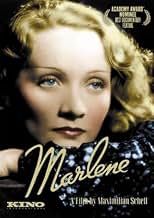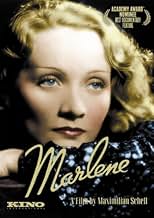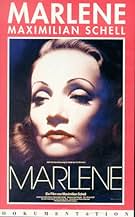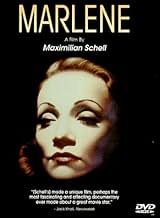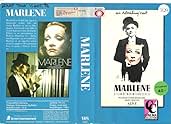Retrospective on the career of enigmatic screen diva Marlene Dietrich.Retrospective on the career of enigmatic screen diva Marlene Dietrich.Retrospective on the career of enigmatic screen diva Marlene Dietrich.
- Director
- Writers
- Stars
- Nominated for 1 Oscar
- 5 wins & 2 nominations total
- Director
- Writers
- All cast & crew
- Production, box office & more at IMDbPro
Featured reviews
A documentary retrospective on the career of enigmatic screen diva Marlene Dietrich.
I do not really know much about Marlene Dietrich. I have seen a few of her better known films, such as "Blue Angel", but know almost nothing about her personally. This documentary was good for fixing that, really allowing her to tell her story in her own words.
Apparently she did not want to be filmed, but agreed to be recorded. I actually think this makes for a better film. It allows for more footage to be shown, which is great when so many of her earlier works are hard to track down. Also, it serves little purpose to show her as an elderly woman... I mean, especially now that we saw how much better the screen time can be used.
I do not really know much about Marlene Dietrich. I have seen a few of her better known films, such as "Blue Angel", but know almost nothing about her personally. This documentary was good for fixing that, really allowing her to tell her story in her own words.
Apparently she did not want to be filmed, but agreed to be recorded. I actually think this makes for a better film. It allows for more footage to be shown, which is great when so many of her earlier works are hard to track down. Also, it serves little purpose to show her as an elderly woman... I mean, especially now that we saw how much better the screen time can be used.
MARLENE (1984) is a documentary of one of the 20th cetury's most alluring women.
As I write this (late Oct, '11), we've just had the passing of APPLE CEO, Steve Jobs, and, these 2 different people have a lot in common:
They both were very controlling of their image.
Marlene was discovered, molded by director Josef von Sternberg. As the world, and media were quite different, Marlene was molded in different ways. Everything - from (supposedly) having her back molars removed, to the way she was lit - EVERYTHING was tightly controlled.
I say this, because when MARLENE's director (and one-time Dietrich co-star) Maximillian Schell approached Dietrich, she said yes (Ms. Dietrich had for the past 20 years, had become a virtual recluse - her only prior screen appearance - JUST A GIGOLO, had featured Ms. Dietrich behind both gauze, and diffusion filters on the lens - he felt he would 'direct.'
However, one of Ms. Dietrich's stipulations, was that she not be filmed - only allowing her voice to be recorded.
I can understand both Mr. Schell's disappointment with this arrangement, but, I also understand Ms. Dietrich's urge to control her image.
She wanted to till be perceived by her fans as she once was.
It's apparent to the viewer that Ms. Dietrich felt that at this point (1984) her life was, in essence - over.
Whether you agree or not, bear in mind that this is the view of a woman, who, from her teen years onward, hab been so controlled, that, as the years had passed, she was at a point in her life where (she felt) she could no longer 'create' the illusion of 'Marlene Dietrich.'
Let me give a quick background;
When film work became scarce, Marlene moved to the stage, where she did her incredible stage shows, but, even then - everything the public saw, was heavily controlled: lighting, the clothing (heavy under-boning, built in, to give Ms. Dietrich a 'va-va-voom' look.
I can't recall who said it, but, someone had seen one of her stage performances, where she appeared (well in to her 60's!) as the eternally gorgeous Marlene Dietrich.
He went backstage, and said he saw an 'old woman - ironing.'
That was Ms. Dietrich, sans the lighting, the makeup, the beautifully constructed gowns.
So, it is with bearing this in mind, that, by '84, Ms. Dietrich had long ago retired, from 'life,' - the artificially created, maintained 'Marlene Dietrich,' only allowing those most intimate to see her.
Having said this, I can understand both Mr. Schell's disappointment with this arrangement, but, I also understand Ms. Dietrich's urge to control her image.
She wanted to till be perceived by her fans as she once was.
What the end result is, is a dialogue between Ms. Dietrich and, Mr.Schell - as the two watch Marlene's films, and comment on them.
'Shhmutz,' (a German word meaning dirt) as well as 'kitsch' (tasteless), are two words that Ms. Dietrich uses to describe many of her best-loved, classic films.
I think a large part of this film is what's NOT seen - NOT heard.
The voice - still strong - is that of a woman, who sees herself, her life, as being one big performance, and, sadly, doesn't see the love, and adulation, but can only view her 'professional' self, and all it's imperfections, with a cold, clinical eye.
Mr. Schell, who is obviously a fan, as well as an actor/director - tries though MARLENE to subtly get Ms. Dietrich to open up, and see the love, but, sadly, that never happens.
As a fan of hers, I could laugh at her jokes, but, I still felt melancholic.
You wish: 'if only she knew.'
If only.
As I write this (late Oct, '11), we've just had the passing of APPLE CEO, Steve Jobs, and, these 2 different people have a lot in common:
They both were very controlling of their image.
Marlene was discovered, molded by director Josef von Sternberg. As the world, and media were quite different, Marlene was molded in different ways. Everything - from (supposedly) having her back molars removed, to the way she was lit - EVERYTHING was tightly controlled.
I say this, because when MARLENE's director (and one-time Dietrich co-star) Maximillian Schell approached Dietrich, she said yes (Ms. Dietrich had for the past 20 years, had become a virtual recluse - her only prior screen appearance - JUST A GIGOLO, had featured Ms. Dietrich behind both gauze, and diffusion filters on the lens - he felt he would 'direct.'
However, one of Ms. Dietrich's stipulations, was that she not be filmed - only allowing her voice to be recorded.
I can understand both Mr. Schell's disappointment with this arrangement, but, I also understand Ms. Dietrich's urge to control her image.
She wanted to till be perceived by her fans as she once was.
It's apparent to the viewer that Ms. Dietrich felt that at this point (1984) her life was, in essence - over.
Whether you agree or not, bear in mind that this is the view of a woman, who, from her teen years onward, hab been so controlled, that, as the years had passed, she was at a point in her life where (she felt) she could no longer 'create' the illusion of 'Marlene Dietrich.'
Let me give a quick background;
When film work became scarce, Marlene moved to the stage, where she did her incredible stage shows, but, even then - everything the public saw, was heavily controlled: lighting, the clothing (heavy under-boning, built in, to give Ms. Dietrich a 'va-va-voom' look.
I can't recall who said it, but, someone had seen one of her stage performances, where she appeared (well in to her 60's!) as the eternally gorgeous Marlene Dietrich.
He went backstage, and said he saw an 'old woman - ironing.'
That was Ms. Dietrich, sans the lighting, the makeup, the beautifully constructed gowns.
So, it is with bearing this in mind, that, by '84, Ms. Dietrich had long ago retired, from 'life,' - the artificially created, maintained 'Marlene Dietrich,' only allowing those most intimate to see her.
Having said this, I can understand both Mr. Schell's disappointment with this arrangement, but, I also understand Ms. Dietrich's urge to control her image.
She wanted to till be perceived by her fans as she once was.
What the end result is, is a dialogue between Ms. Dietrich and, Mr.Schell - as the two watch Marlene's films, and comment on them.
'Shhmutz,' (a German word meaning dirt) as well as 'kitsch' (tasteless), are two words that Ms. Dietrich uses to describe many of her best-loved, classic films.
I think a large part of this film is what's NOT seen - NOT heard.
The voice - still strong - is that of a woman, who sees herself, her life, as being one big performance, and, sadly, doesn't see the love, and adulation, but can only view her 'professional' self, and all it's imperfections, with a cold, clinical eye.
Mr. Schell, who is obviously a fan, as well as an actor/director - tries though MARLENE to subtly get Ms. Dietrich to open up, and see the love, but, sadly, that never happens.
As a fan of hers, I could laugh at her jokes, but, I still felt melancholic.
You wish: 'if only she knew.'
If only.
10Signet
Schell turns Dietrich's refusal to appear on-camera for him from what could have been a disaster to a distinct artistic advantage. Being able only to hear her growl her own commentary over scenes from earlier films, newsreels, etc., gives this picture an amazing power and poignancy that it would not have otherwise. An amazing movie.
Maximilian Schell's documentary portrait of legendary screen siren Marlene Dietrich separates the woman from her myth, but because Dietrich herself refused to appear on camera the director was presented with a dilemma: how to construct the film without its subject? His clever (if desperate) solution was to document, instead, his own frustration in making the film, using Dietrich's disembodied, tape recorded voice to supplement scenes of the director scrambling for cohesive footage.
Surprisingly, the finished film (messy as it often is) creates a remarkably full picture of the reclusive star, despite (and in large part because of) her absence. Dietrich's voice alone – obstinate, caustic, skeptical of Schell's project, scornful of her own allure – says more (with more insight) than any scripted monologue could provide, and her unedited conversations with Schell (an old comrade) are unpredictable and candid, often becoming verbal sparring matches in two languages.
Surprisingly, the finished film (messy as it often is) creates a remarkably full picture of the reclusive star, despite (and in large part because of) her absence. Dietrich's voice alone – obstinate, caustic, skeptical of Schell's project, scornful of her own allure – says more (with more insight) than any scripted monologue could provide, and her unedited conversations with Schell (an old comrade) are unpredictable and candid, often becoming verbal sparring matches in two languages.
Yet, HERE! Perhaps the most intimate documentary ever filmed.
An 82-year old legend who refuses to be photographed, yet whose voice alone raises hackles, cackles and longing over a brilliant assemblage of stock and custom footage.
As much as anything, "Marlene" is a film about trying to film somebody: trying to know somebody.
"Nein, nein, nein," it begins. "No, no no," Marlene instantly dismisses us and this documentary.
Its last word, from Dietrich's own lips, finally resigned, crying softly, is, "Maybe." One of the most haunting, heartbreaking films ever made.
Never has there been as deep a glance into any other screen Goddess' life as this.
Ironic. The most private, iconic of early screen actresses, extends her career for nearly sixty years -- including live performances around the world (unlike, say, Greta Garbo) and culminates in one of the more enigmatic yet fulfilling performances of the century with her voice alone in "Marlene." Thanks solely to Maximillian Schell, whose genius as a film maker rose to Dietrich's genius as a tart risen to lady and finally to goddess.
"Maybe." Indeed.
An 82-year old legend who refuses to be photographed, yet whose voice alone raises hackles, cackles and longing over a brilliant assemblage of stock and custom footage.
As much as anything, "Marlene" is a film about trying to film somebody: trying to know somebody.
"Nein, nein, nein," it begins. "No, no no," Marlene instantly dismisses us and this documentary.
Its last word, from Dietrich's own lips, finally resigned, crying softly, is, "Maybe." One of the most haunting, heartbreaking films ever made.
Never has there been as deep a glance into any other screen Goddess' life as this.
Ironic. The most private, iconic of early screen actresses, extends her career for nearly sixty years -- including live performances around the world (unlike, say, Greta Garbo) and culminates in one of the more enigmatic yet fulfilling performances of the century with her voice alone in "Marlene." Thanks solely to Maximillian Schell, whose genius as a film maker rose to Dietrich's genius as a tart risen to lady and finally to goddess.
"Maybe." Indeed.
Did you know
- TriviaDirector Maximilian Schell got Marlene Dietrich to agree to appear in this documentary only on the stipulation that she not be photographed as she looked at the time. Instead, we only hear her in interviews.
- GoofsThe documentary states that "Dietrich" was the maiden name of Marlene's mother. This is completely untrue. Wilhelmina Dietrich was born Wilhelmina Felsing. Dietrich was the name of Marlene's biological father, Louis Dietrich, after whose death Wilhelmina married Eduard von Losch, who thereby became Marlene's stepfather.
- Quotes
[Last line, to director Maximilian Shell about this film]
Marlene Dietrich: You never sell that in America.
Details
- Release date
- Country of origin
- Languages
- Also known as
- Marlene: An Astonishing Visit
- Production companies
- See more company credits at IMDbPro
Box office
- Gross US & Canada
- $852,676
- Opening weekend US & Canada
- $14,490
- Nov 9, 1986
- Gross worldwide
- $852,676
Contribute to this page
Suggest an edit or add missing content

